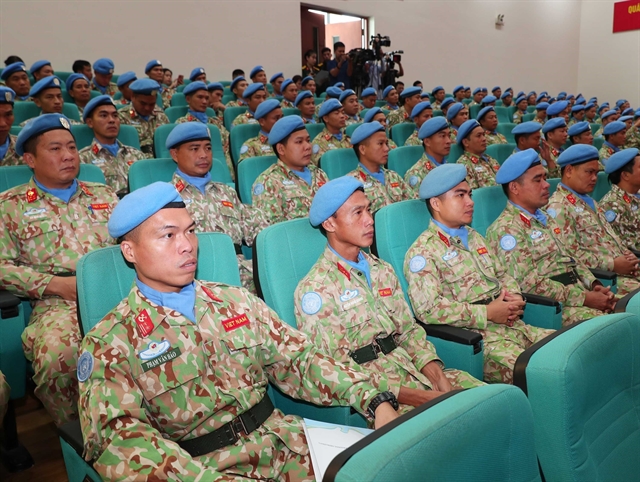 Politics & Law
Politics & Law


|
| Soldiers attending the conference in Hà Nội to review the term of duty of Engineering Team No. 3 and Level-2 Field Hospital No. 6 at the United Nations peacekeeping missions. VNA/VNS Photo |
HÀ NỘI – The Central Military Commission and the Ministry of National Defence will continue to study and expand the scale, form and geographical scope of Việt Nam’s participation in UN peacekeeping operations, said Deputy Minister of National Defence, Senior Lieutenant General Hoàng Xuân Chiến.
The Ministry of National Defence on Thursday (October 16) held a conference in Hà Nội to review the term of duty of Engineering Team No. 3 and Level-2 Field Hospital No. 6 at United Nations peacekeeping missions.
The Việt Nam Department of Peacekeeping Operations, in September 2024, deployed Level-2 Field Hospital No. 6, consisting of sixty-three service members, to the UN Mission in South Sudan (UNMISS), and Engineering Team No. 3, with 184 members to the UN Interim Security Force for Abyei (UNISFA).
Both units have now completed their missions and returned home safely.
Praising the achievements of the two units, Chiến commended the soldiers for their outstanding performance and absolute safety.
“You have excelled in community engagement and spread the image of the ‘blue berets’ of Vietnamese peacekeepers, further enhancing the reputation of the ‘Uncle Hồ’s soldiers’ on the international stage,” Chiến said at the meeting.
“UN mission commanders highly valued our strict discipline, professionalism and expertise. I believe these are significant successes of the two unit-level formations we have deployed.”
In the coming period, the Central Military Commission and the Ministry of National Defence will continue to study and expand the scale, form and geographical scope of Việt Nam’s participation in UN peacekeeping operations.
“This is a humanitarian and consistent policy within our foreign affairs strategy,” he said.
“Recently, on behalf of the Central Military Commission and the Ministry of National Defence, I reported to the Politburo and sought guidance on expanding five types of units: a mechanised infantry, a signal (communications), a military police or military prosecution, an airfield support, and a multi-role transport helicopter.”
The general urged Engineering Team No. 3, Level-2 Field Hospital No. 6 and individual members to continue promoting their experience and sense of responsibility, spreading the image of Vietnamese 'blue beret' soldiers and remaining ready to fulfil all assigned missions.
Relevant agencies and units were asked to ensure proper policies, job placements and training for personnel returning from missions, as well as to prepare high-quality forces for the 2025–2030 period.
The Việt Nam Department of Peacekeeping Operations was tasked with coordinating with relevant agencies to receive personnel from the two units, working closely with the Army Corps of Engineers, the Military Medical Academy and Military Hospital 175 to train and equip rotating forces.
The department will also monitor UN missions’ developments and promptly advise the Central Military Commission and the Ministry of National Defence on issues related to Việt Nam’s participation in UN peacekeeping operations.
During their term, Engineering Team No. 3 successfully completed over 300km of main supply road upgrades and repairs, each road 20-24m wide, allowing heavy vehicles to travel safely at 80-90km per hour.
The unit also applied K-31 soil stabilisation technology to reinforce a 27,215-sq.m airfield, effectively preventing dust and water accumulation — an innovation highly praised by the UN mission.
Additionally, the team built two large workshops within three months — ahead of schedule — and developed high-quality smart barracks for UN peacekeepers.
They also conducted over 200 heavy vehicle recovery operations, cleared congested routes and assisted with mission logistics.
Meanwhile, Level-2 Field Hospital No. 6 delivered excellent medical services, admitting and treating 2,650 patients, including UN staff and local residents, ensuring absolute medical safety.
The hospital successfully handled many complex cases, notably the reattachment surgery of a nearly severed finger on a Pakistani peacekeeper, whose full recovery was commended by the UN Mission Commander and Sector Commander and reported at UN Headquarters.
With its professionalism and dedication, Level-2 Field Hospital No. 6 became a trusted medical facility for UN staff, local authorities and residents.
It was authorised to treat difficult cases in-house, conducted 6,585 physiotherapy sessions, enhanced the reputation of traditional Vietnamese medicine and effectively implemented preventive measures against malaria, monkeypox and cholera outbreaks. — VNS




